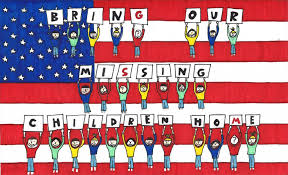Sunday, May 25, 2014 is National Missing Children’s Day
Posted in: Child Endangerment,Child Welfare,Crime,endangering the welfare of a child,Etan Patz,Kidnapping/Abduction,Missing Persons,Ronald Wilson Reagan
Sunday, May 25 is National Missing Children’s Day.
National Missing Children’s Day is an annual observation in the United States designed to highlight the problem of child kidnapping and abduction. It is observed on May 25 because that is the date in 1979 that 6 year old Ethan Patz disappeared on his way to school in New York City, NY. National Missing Children’s Day was first observed in 1983 when it was first proclaimed by President Ronald Reagan.
National Missing Children’s Day is commemorated this Sunday, May 25 and aims to remind the public of the numerous cases of America’s missing children.
The most recent study conducted by The National Center for Missing and Exploited Children states, that approximately 800,000 children younger than 18 were reported missing in one year.
National Missing Children’s Day has been commemorated in the United States on May 25, since 1983, when it was first proclaimed by President Ronald Reagan.
It falls on the same day as the International Missing Children’s Day.
10 Ways to honor National Missing Children’s Day:
1. Share a poster.
2. Take the Pledge.
3. Like us on Facebook and Twitter.
4. Make sure your wireless AMBER Alerts are activated.
5. Get a free lapel pin and wear it.
6. Change your profile cover photo.
7. Give.
8. Bookmark the anniversaries page.
9. Make a Child ID.
10. Know what to do if you see a missing child.
Key facts from the National Center for Missing and Exploited Children:
- The most recent, comprehensive national study for the number of missing children estimated in 1999:
- Approximately 800,000 children younger than 18 were reported missing.
- More than 200,000 children were abducted by family members.
- More than 58,000 children were abducted by nonfamily members.
- An estimated 115 children were the victims of “stereotypical” kidnapping. These “stereotypical” kidnappings involved someone the child did not know or was an acquaintance. The child was held overnight, transported 50 miles or more, killed, ransomed or held with the intent to keep the child permanently.
- To find the number of children missing from a specific state or territory contact the state’s Missing Child Clearinghouses.
- The first three hours are the most critical when trying to locate a missing child. The murder of an abducted child is rare, and an estimated 100 cases in which an abducted child is murdered occur in the U.S. each year. A 2006 study indicated that 76.2 percent of abducted children who are killed are dead within three hours of the abduction.
- The National Center for Missing & Exploited Children® has assisted law enforcement in the recovery of more than 193,705 missing children since it was founded in 1984. Our recovery rate for missing children has grown from 62 percent in 1990 to 97 percent today.
- The AMBER Alert program was created in 1996 and is operated by the U.S. Department of Justice. As of April 2, 2014, 688 children have been successfully recovered as a result of the program. [3]
- As of Dec. 2013, NCMEC’s toll free, 24 hour call center has received more than 3,899,964 calls since it was created in 1984. Information about missing or exploited children can be reported to the call center by calling 1-800-THE-LOST (1-800-843-5678).
- 93 percent of teens ages 12 to 17 go online.
- Of children five years old and younger who use the Internet, 80 percent use it at least once a week.
- One in 25 children ages 10 to 17 received an online sexual solicitation where the solicitor tried to make offline contact.
- Four percent of cell phone owning teens ages 12 to 17 say they have sent sexually suggestive nude/semi-nude messages to others via text message.
- 15 percent of cell phone owning teens ages 12 to 17 say they have received sexually suggestive nude/semi-nude images of someone they know via text.
Return to: Sunday, May 25, 2014 is National Missing Children’s Day


Social Web